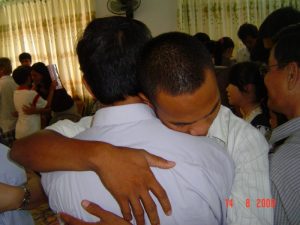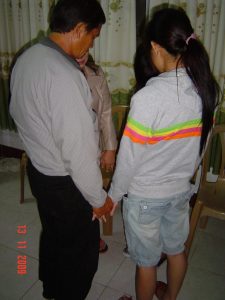Mission Network News, October 24, 2017
Vietnam (MNN) – For Christians in Vietnam, the future is looking bleak. Last November, the country’s National Assembly ratified its first ever Law on Belief and Religion, which significantly limits religious freedom in the Buddhist-majority country.
The law doesn’t take effect until next January, but increases in persecution toward Christians are already evident. Tim Muret with Open Doors USA explains, “Vietnam is one of the most ethnically diverse societies in the Asia Pacific region, which means that the vast majority of citizens follow ethnic or tribal religion, or no religion at all. What that means is that Christians in the country are a clear minority, and that also means that the Protestant believers typically belong to an ethnic minority.

(Photo courtesy of Open Doors USA)
“These ethnic minorities are very tribal, and they’re very protective of their customs, their regions, and they have a lot of authority in their local governments. They view Christianity as a threat basically, something that is challenging their culture, their heritage. In many cases, they can operate with impunity. They can attack, they force people out of their villages, there’s violence, there are homes being burned, and so on, if people do not convert back to the local customs.”
Vietnam sits at No. 17 on Open Doors’ World Watch List of countries where Christians face the most persecution. Muret says churches must register with the government, list all of its members, and even provide a calendar listing each sermon and its topic every year.
The New Law on Belief and Religion, many human rights groups say, will be used to restrict religious freedom even more. Parliamentarians, human rights groups, and religious groups say the law fails to meet international standards on freedom of religion or belief. They say vague phrasing in clauses prohibiting using religion to undermine “national security, “national unity,” and “public order” could be used to further repress religious expression.
“The government there claims the law will, their language is, ‘Optimize their ability’ to sort of administer religious affairs,” Muret says. “However, our team on the ground there is a little nervous about what it might mean in terms of more restrictions in terms of what churches can and cannot do. Can they hold outreach events? Can they gather in large groups? Can they sing loudly enough for their neighbors to hear them?”

(Photo courtesy of Open Doors USA)
The challenges are increasing, but these believers aren’t facing them alone. Open Doors is working on the ground in Vietnam, distributing Bibles and providing discipleship training, as well as providing microloan programs and job and literacy training.
“One of the trainings we have is persecution training,” Muret says. “Basically, it’s letting these Christians know that facing persecution is part of what you’re in for when you become a Christian. The Bible is very clear on that. It helps them to rely on the Word, persevere, and react with love and not anger or intimidation.”
Religious persecution is something most people in the West have never experienced. Though it may be difficult to empathize with these believers’ struggles, Muret says it’s important we keep them in our prayers. Pray that they would remain bold in their faith and that God would open the hearts of their family members. Pray also for a loosening of government restrictions.
Height Insoles: Hi, I do believe this is an excellent site. I stumbledupon …
http://fishinglovers.net: Appreciate you sharing, great post.Thanks Again. Keep writi…
Achilles Pain causes: Every weekend i used to pay a quick visit this site, as i w…






October 25, 2017
Christians face increased persecution in Vietnam
by Nhan Quyen • [Human Rights]
Mission Network News, October 24, 2017
Vietnam (MNN) – For Christians in Vietnam, the future is looking bleak. Last November, the country’s National Assembly ratified its first ever Law on Belief and Religion, which significantly limits religious freedom in the Buddhist-majority country.
The law doesn’t take effect until next January, but increases in persecution toward Christians are already evident. Tim Muret with Open Doors USA explains, “Vietnam is one of the most ethnically diverse societies in the Asia Pacific region, which means that the vast majority of citizens follow ethnic or tribal religion, or no religion at all. What that means is that Christians in the country are a clear minority, and that also means that the Protestant believers typically belong to an ethnic minority.
(Photo courtesy of Open Doors USA)
“These ethnic minorities are very tribal, and they’re very protective of their customs, their regions, and they have a lot of authority in their local governments. They view Christianity as a threat basically, something that is challenging their culture, their heritage. In many cases, they can operate with impunity. They can attack, they force people out of their villages, there’s violence, there are homes being burned, and so on, if people do not convert back to the local customs.”
Vietnam sits at No. 17 on Open Doors’ World Watch List of countries where Christians face the most persecution. Muret says churches must register with the government, list all of its members, and even provide a calendar listing each sermon and its topic every year.
The New Law on Belief and Religion, many human rights groups say, will be used to restrict religious freedom even more. Parliamentarians, human rights groups, and religious groups say the law fails to meet international standards on freedom of religion or belief. They say vague phrasing in clauses prohibiting using religion to undermine “national security, “national unity,” and “public order” could be used to further repress religious expression.
“The government there claims the law will, their language is, ‘Optimize their ability’ to sort of administer religious affairs,” Muret says. “However, our team on the ground there is a little nervous about what it might mean in terms of more restrictions in terms of what churches can and cannot do. Can they hold outreach events? Can they gather in large groups? Can they sing loudly enough for their neighbors to hear them?”
(Photo courtesy of Open Doors USA)
The challenges are increasing, but these believers aren’t facing them alone. Open Doors is working on the ground in Vietnam, distributing Bibles and providing discipleship training, as well as providing microloan programs and job and literacy training.
“One of the trainings we have is persecution training,” Muret says. “Basically, it’s letting these Christians know that facing persecution is part of what you’re in for when you become a Christian. The Bible is very clear on that. It helps them to rely on the Word, persevere, and react with love and not anger or intimidation.”
Religious persecution is something most people in the West have never experienced. Though it may be difficult to empathize with these believers’ struggles, Muret says it’s important we keep them in our prayers. Pray that they would remain bold in their faith and that God would open the hearts of their family members. Pray also for a loosening of government restrictions.